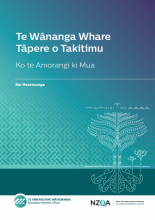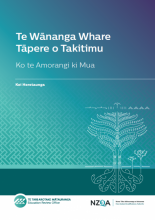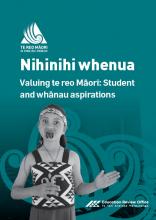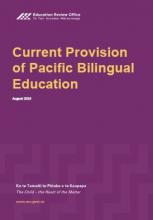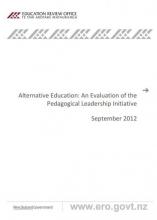- Topics: Church-based groups, Decision making, Mental health, Ongoing education, Pacific bilingual, Te Pou Mataaho | Evaluation and Research Māori
- Published: 10 May 2021
Exploring Collaboration in Action: Kahukura Community of Practice
ERO was approached by principals from Kahukura to document and evaluate their community of practice in Christchurch. This report identifies what is working well for this community of practice, areas where they might consider further enhancements, and lessons and insights into practices which could be shared with others.
- Published: 10 May 2021
Collaboration in Action: Lessons from a Community of Practice
This short report accompanies our report Exploring Collaboration in Action: Kahukura Community of Practice. It looks at the lessons that can be learnt from the Kahukura community of practice, drawing out key lessons on collaboration and providing seven key implications for schools who are interested in collaborating to consider.
- Published: 19 Jan 2021
Te Kahu Whakahaumaru – Ngā mahi a te rangai mātauranga Māori (English)
Te Pou Mataaho, ERO’s evaluation and research group, and Te Uepū ā Motu, ERO’s national evaluation and review team, pursued this evaluation to provide an evidence base about the initial impacts of Covid-19 on Māori-medium education and how the sector responded.
- Published: 19 Jan 2021
Te Kahu Whakahaumaru – Ngā mahi a te rangai mātauranga Māori (Māori)
I whāia tēnei arotake e Te Pou Mataaho, te rōpū arotake, rangahau hoki a Te Tari Arotake Mātauranga me Te Uepū ā-Motu, te rōpū arotake ā-motu a Te Tari Arotake Mātauranga, ki te whakaputa i tētahi kohinga taunakitanga e kitea ai ngā pānga tōmua o te Mate Korona ki te rāngai mātauranga reo Māori, me ngā rautaki i whāia ai e taua rāngai.
- Published: 10 Dec 2020
Te Kahu Whakahaumaru: Māori continue to show resilience across Māori-medium education
In Aotearoa, Māori-medium education experienced significant disruption when the outbreak of Covid-19 forced kura to close their doors, and whānau and kaiako to adjust to home schooling and distance learning. Among the many challenges were access to technology and resources with Māori communities among the most affected.
- Published: 10 Dec 2020
E whakatinana tonu nei te rāngai mātauranga reo Māori i te manawanui
I Aotearoa nei, i tino raru te rāngai mātauranga reo Māori i te horapatanga o te Mate Korona, i kati ai ngā tatau o ngā kura, i mate ai hoki ngā whānau me ngā kaiako ki te tīni i ā rātou mahi ki te whakaako ki te kāinga me te ako tawhiti.
Ko tētahi raru i roto i te huhua, ko te korenga o ngā taputapu matihiko me ngā rauemi, ka mutu ko ngā hapori Māori ērā i rongo i te korekore rawa atu nei.
- Published: 15 Sep 2020
Nihinihi Whenua – Valuing te reo Māori: Student and whānau aspirations
This report provides a snapshot of student and whānau perspectives on the teaching of te reo Māori. It follows the June publication of Te Tāmata Huaroa, which provides a review of the current status of te reo Māori in English medium school settings.
- Published: 18 Jun 2020
Te Tāmata Huaroa: Te Reo Māori in English-medium Schooling
This report gives a snapshot of the current provision of te reo Māori teaching and learning in a representative sample of English-medium primary and secondary schools. The education sector is seen as an important lever in the Government’s Maihi Karauna strategy for language revitalisation.
- Published: 16 Aug 2019
Current Provision of Pacific Bilingual Education
Based on surveys and interviews of 25 schools, this report describes the current state of Pacific bilingual units in New Zealand: their philosophy, curriculum, teaching, assessment and transition practices, tracking of learners’ pathways and outcomes, and the support they receive.
- Published: 25 Sep 2018
Provision for Students in Activity Centres
There are 14 activity centres in New Zealand that cater for secondary school students (Years 9 ‑ 13) who are at risk of disengaging from mainstream schooling and at risk of low educational, social and vocational outcomes. Activity centres are established by agreement of the Minister of Education. Priority is given to those students whose behaviour is likely to impede their own learning and the learning of others, and who are most likely to benefit from the programme.
- Published: 04 Sep 2017
Stewardship: informed decision making
At Manurewa Central School, the relationship between the principal and trustees is described in terms of how trust and confidence is built through effective listening and transparent reporting, interrogation and discussion of information.
- Published: 30 May 2016
Vocational pathways: authentic and relevant learning
ERO evaluated how well 35 secondary schools were using Vocational Pathways. While most schools knew about and were using the pathways, they were not fully realising the initiative’s potential. Vocational Pathways can be a valued part of a school’s curriculum for all students when used as more than just an add-on to careers education or course selection processes.
- Published: 21 Mar 2016
Wellbeing for success: effective practice
In 2014, the Education Review Office (ERO) undertook an evaluation of the extent to which schools were promoting and responding to student wellbeing in primary and secondary schools. This 2016 effective practice report provides further detail about practices in selected schools that promote wellbeing for all students, and describes how these schools respond when concerns, issues or events require more targeted support.
- Published: 21 Mar 2016
Wellbeing for success: a resource for schools
Wellbeing for success: a resource for schools has been developed to help schools evaluate and improve student wellbeing. It highlights the importance of schools promoting the wellbeing of all students as well as the need for systems, people and initiatives to respond to wellbeing concerns for students who need additional support.
- Published: 19 Feb 2015
Wellbeing for Young People's Success at Secondary School
This report presents the findings of ERO’s evaluation of how well 68 secondary schools in Term 1 2014 promoted and responded to student wellbeing.
- Published: 19 Feb 2015
Wellbeing for Children's Success at Primary School
This report documents the findings of ERO's evaluation of how well 159 primary schools reviewed in Term 1 2014 promoted and responded to student wellbeing.
- Published: 10 Dec 2013
Improving Guidance and Counselling for Students in Secondary Schools
The Prime Minister’s Youth Mental Health Project aims to improve the mental health of young people aged 12 to 19 years. One initiative of this project is a national evaluation of the current provision of guidance and counselling in schools.
The Education Review Office (ERO) evaluated how well 44 schools and five wharekura provided guidance and counselling for students.
- Published: 02 Oct 2012
Alternative Education: An Evaluation of the Pedagogical Leadership Initiative
In 2011 the Ministry of Education introduced funding for pedagogical leadership in alternative education to improve the quality of teaching and learning. This evaluation examined the impact of that funding initiative by looking at the work of 10 clusters providing alternative education. It also identified a set of principles to provide guidance on good practice.
